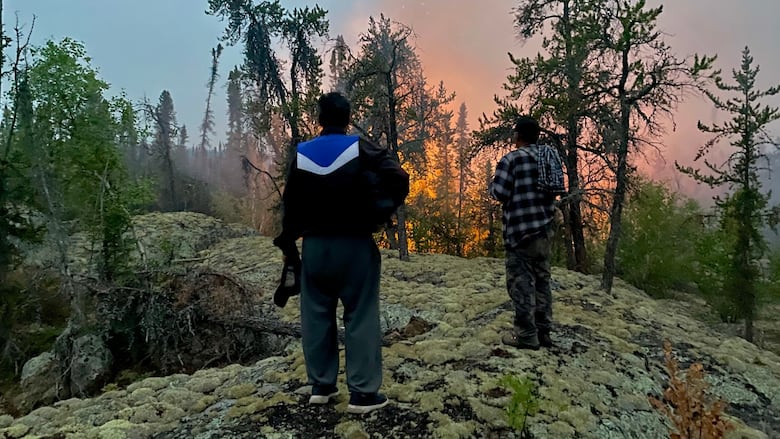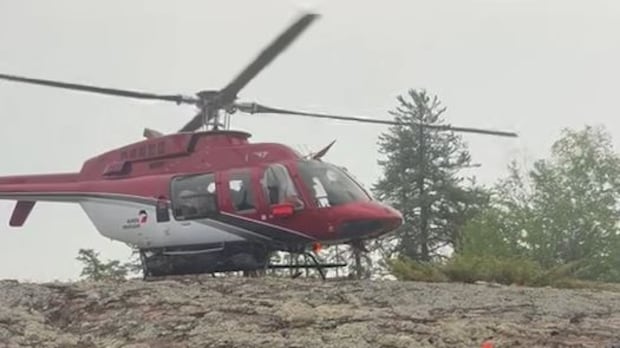N.W.T. canoe trip turns into emergency evacuation as paddlers flee wildfire
42 paddlers from Gamètì rescued by helicopter last weekend after scrambling from campsite in middle of night

A canoe trip turned into an emergency evacuation last weekend for 42 Tłı̨chǫ paddlers in the N.W.T., after a wildfire came dangerously close to their campsite.
The annual Trails of Our Ancestors journey brings together participants from across the Tłı̨chǫ region to connect with history and retrace traditional travel routes. The program experienced a record-breaking number of participants this year, with 28 canoes and over 160 paddlers departing from several communities.
Eleven canoes with 66 paddlers departed from Wekweèti, on July 28. The same day, another group left from Gamètì with 42 paddlers in seven canoes. The rest of the paddlers departed from Whatì on August 4.
The group from Gamètì was six days into their trip when they encountered a wildfire early Sunday morning.
Gamètì Chief Doreen Arrowmaker, who was with the group, said they were already struggling with low water levels, which they anticipated would be a challenge, when they reached a particularly tough stretch with a gruelling portage that took 40 minutes one way, in sweltering heat.

The group set up camp for the night later than expected on a traditional hilltop along the portage trail. After eating and socializing fireside, the campers started to settle into their beds at around midnight. Arrowmaker said the group's K'àowo (leader) made the decision to have a night watch.
"Five or six guys volunteered to watch camp on shifts to monitor for wildlife," she said. "[There] were smaller kids travelling with us, so we felt it best to have night watchers."
A few hours later, around 3 a.m., those on night watch noticed an orange glow on the horizon.
"Some of them thought that the sun was rising already," Arrowmaker said. "And then when they look closely, they realized that it was a fire."

The rest of the group was alerted and quickly packed what they could in the dark, using headlamps and flashlights. Arrowmaker said the fire was so close she could see flames and embers coming up around them.
"We could hear the fire, you know how it makes that noise? I can't even describe the sound," she said. "It was a frightening experience ... and we were afraid we might get trapped."
The group moved quickly down the hill to reach their boats. Arrowmaker said they then made their way to a nearby island before embarking on another difficult portage over land and upstream in thick smoke to reach a second island, where they waited for rescuers. It was then about 5 a.m.

The group had to clear an area for the helicopters to land. Not long after, Great Slave Helicopters and Acasta HeliFlight arrived and began flying people out in groups, first the children, then the women and elders.
Arrowmaker said paddlers were returned to Gamètì before visibility worsened and grounded flights. Participants who couldn't return home are now staying with family, friends, or in hotels in Behchokǫ̀ and Yellowknife.
According to N.W.T. Fire, the wildfire that threatened the group was human-caused, and still burning out of control as of Wednesday. It was an estimated one hectare in size, and being monitored by fire officials.
Staying calm and working together
Despite the traumatic experience, Arrowmaker said she was proud of their K'àowo and the paddlers for remaining calm and working well together.
"We all knew that human lives were more important than material things," she said. "We want to make sure that people are safe, and that's what we work hard for."
She also praised the young people who were part of the group, saying they played a critical role in helping the elders.
"They were the ones that really got into the riverways … and helped a lot of these older people," she said. "Not only with their boats, but also with their packs."

Arrowmaker said many of the Gamètì paddlers still want to finish what they started. The group plans to recover the canoes they left behind and restart their journey near Russell Lake, aiming to reunite with the other paddling groups before arriving on the water in Behchokǫ̀ for the annual Tłı̨chǫ gathering, next week.
Arrowmaker said this year's canoe journey will be remembered as one of the most challenging, and also frightening and traumatic for some participants. But she said challenges are part of the journey, and the paddlers got through it all by working together.
"You know, we had a really good group," she said. "I think one of the things I'll ever take away from this trip is that it was fun being out in the land, and I really enjoyed being with the people."



